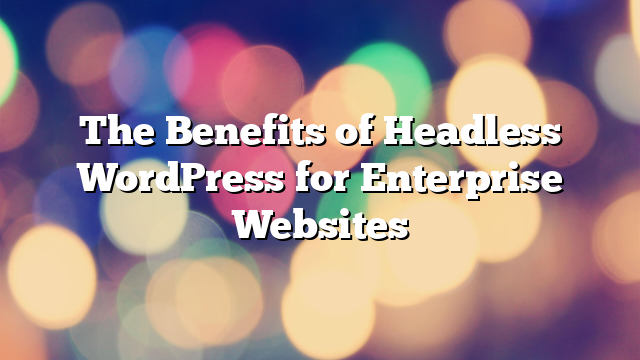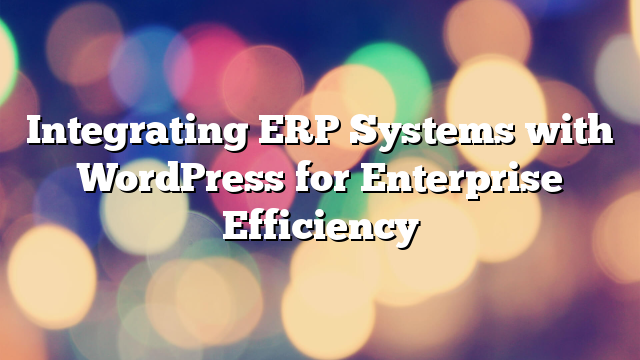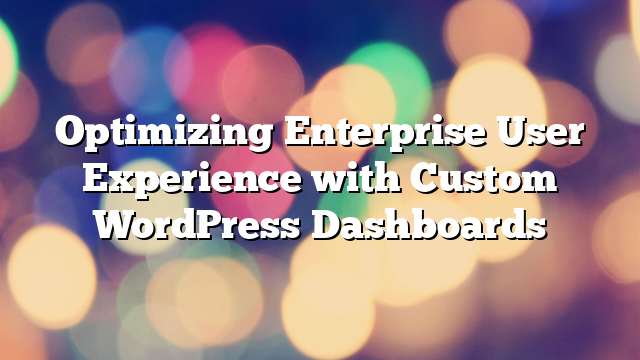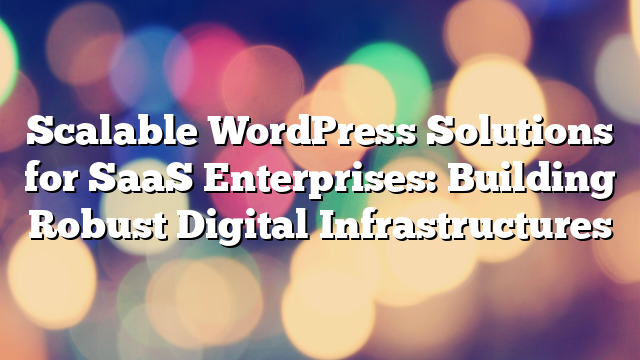The Benefits of Headless WordPress for Enterprise Websites
28.12.2024

In an era where businesses need flexibility, scalability, and performance from their digital platforms, Headless WordPress has emerged as a game-changer for enterprise websites. By decoupling the front-end presentation layer from the WordPress back-end, this approach offers unmatched customization and efficiency. In this article, we’ll explore why enterprises are increasingly adopting Headless WordPress and how it can revolutionize web development.
What is Headless WordPress?
Headless WordPress separates the back-end content management system (CMS) from the front-end delivery layer. Instead of relying on traditional WordPress themes for rendering the front-end, Headless WordPress uses APIs to deliver content to external applications, such as web apps, mobile apps, or other platforms.
This architecture provides flexibility in how and where content is displayed, making it ideal for enterprises seeking a modern, omnichannel approach to content delivery.
Key Benefits of Headless WordPress for Enterprises
1. Enhanced Performance
With Headless WordPress, the front-end is typically built using modern JavaScript frameworks like React, Vue.js, or Angular. These frameworks deliver faster loading times and better user experiences, which are critical for enterprise-level websites.
2. Omnichannel Content Delivery
Headless WordPress allows enterprises to publish content across multiple platforms simultaneously. Whether it’s a website, mobile app, IoT device, or digital signage, content is delivered consistently and efficiently via APIs.
3. Improved Scalability
Enterprises often need to handle significant traffic spikes and complex integrations. Headless WordPress scales easily because the front-end and back-end operate independently, allowing for separate optimization and scaling strategies.
4. Greater Front-End Flexibility
Decoupling the front-end enables developers to use any framework or technology they prefer, offering unlimited design and functionality possibilities. Enterprises can create bespoke user experiences tailored to their target audience.
5. Robust Security
Headless WordPress reduces the attack surface by decoupling the front-end from the back-end. With no direct connection between the user interface and the CMS, it becomes more challenging for attackers to exploit vulnerabilities.
6. Future-Proof Architecture
The headless approach ensures that enterprises are not locked into a specific front-end technology. As new frameworks and tools emerge, businesses can adopt them without disrupting their content management system.
Use Cases for Headless WordPress in Enterprises
1. Content-Rich Websites
News portals, blogs, and media websites benefit from the speed and customization of Headless WordPress, providing a superior user experience while handling high traffic volumes.
2. E-Commerce Platforms
Headless WordPress integrates seamlessly with e-commerce solutions like WooCommerce or third-party platforms, enabling enterprises to build highly responsive and visually appealing storefronts.
3. Mobile and Web Applications
For enterprises running mobile apps or progressive web apps, Headless WordPress delivers content via APIs, ensuring consistency across devices and platforms.
4. Multilingual Websites
Global enterprises with multilingual websites can use Headless WordPress to manage translations and deliver content tailored to different regions or audiences.
5. Digital Marketing Campaigns
Headless WordPress allows marketing teams to experiment with dynamic content delivery, personalization, and A/B testing across various platforms without disrupting the back-end.
Challenges of Headless WordPress
1. Increased Complexity
Headless architecture requires advanced development skills and a clear understanding of APIs, JavaScript frameworks, and server configurations. Enterprises may need to invest in skilled developers or agencies.
2. Higher Initial Costs
Setting up a headless system can be costlier than a traditional WordPress setup due to the need for custom development and infrastructure. However, the long-term benefits often outweigh the initial investment.
3. Limited Out-of-the-Box Features
Unlike traditional WordPress, Headless WordPress does not include ready-to-use themes or plugins for the front-end. Custom development is necessary to implement desired features and designs.
4. Maintenance Challenges
Managing separate systems for the front-end and back-end requires regular updates, testing, and monitoring. Enterprises should ensure they have a robust workflow for ongoing maintenance.
Best Practices for Implementing Headless WordPress
1. Define Clear Objectives
Before adopting Headless WordPress, outline your enterprise’s goals and requirements. This clarity will guide the development process and ensure the architecture meets your needs.
2. Leverage APIs Effectively
Use the WordPress REST API or GraphQL to deliver content efficiently. Ensure the API endpoints are optimized for performance and secure against unauthorized access.
3. Choose the Right Front-End Framework
Select a framework that aligns with your team’s expertise and project requirements. Popular choices include React, Vue.js, and Next.js, each offering unique advantages.
4. Prioritize Performance Optimization
Optimize images, enable caching, and use CDNs to ensure fast content delivery. Regular performance audits can help identify and address bottlenecks.
5. Collaborate with Experts
Work with experienced developers or agencies specializing in Headless WordPress. Their expertise will ensure a seamless implementation and ongoing support.
Conclusion
Headless WordPress offers unparalleled flexibility, performance, and scalability, making it an ideal choice for enterprises seeking to deliver exceptional digital experiences. While the transition to a headless architecture may require additional resources and expertise, the long-term benefits far outweigh the challenges. By embracing Headless WordPress, enterprises can future-proof their digital presence and meet the demands of an ever-evolving online landscape.
Ready to take your enterprise website to the next level? Contact AllWebDev today and explore the possibilities of Headless WordPress!



